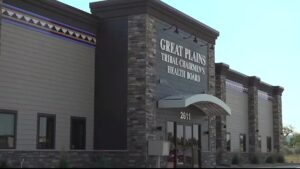Transition at Sioux San raises questions
Transition at Sioux San raises questions
By Clara Caufield,
NSNT Staff Writer
At the end of February, 2022 the Indian Health Service will no longer have a presence in Rapid City. Instead, under the direction of the Great Plains Tribal Health Board (GPTHB) federal health care as mandated by treaty rights to Indians in and around Rapid City will be provided through the Oyate (the people) Health Care Center, which has assumed health care responsibilities from I.H.S. under a PL 93-638 contract.
After years of negotiation and planning, on November 5, 2021 three Tribes announced a historic alliance to improve healthcare for tribal citizens living in Pennington County (basically Rapid City) South Dakota. These include the Oglala, Rosebud and Cheyenne River Sioux Tribes. Prior, the Oglala and Cheyenne River Tribes operated the Oyate Health Center in Rapid City under a contract with the Indian Health Service. After signing the contract with the Health Board, the tribes provided no direct management. The Health board manages Oyate Health Center on their behalf. The addition of the Rosebud Sioux Tribe cleared the way for a dramatic expansion of healthcare, now authorizing Oyate Health Center to assume responsibility for all services for I.H.S. beneficiaries in Pennington County until now provided on the Sioux San campus. This will be under a P.L. 93-638 contract between I.H.S. and GPTHB. The new tri-tribal agreement means the new Oyate Health Center, a $120 million facility, now under construction will no longer be controlled by the federal government which also will no longer be obligated to provide direct or referred health care services.
However, the federal government is still responsible for providing the funding for these services. The Health Board will manage this funding, having more leeway to leverage the funding. For, example, OHC can pursue grant funding which the federal cannot do.
This development has raised questions and concerns from some members of the Rapid City Indian community. Oyate Health Center has an active patient population of 22,000 and growing.
Recently, two tribal elders from Rapid City visited NSNT to share their concerns about the change in health care providers, questions which they say are shared by many others in the Rapid City native community. Chairmane Whiteface, Oglala and Theresa Spry, also Oglala are both opposed to the transfer of health care to Oyate. Whiteface was one of three plaintiffs who raised this concern to the level of the Supreme Court, that case dismissed. She has also served on the 1894 Sioux Nation Treaty Council for decades, the organization that claims responsibility for getting Congress to establish the Sioux San I.H.S. hospital in Rapid City, back in the 1950’s. Spry, also Oglala and a health professional has also been active in the Rapid City native community for decades is an acknowledged community spokesperson.
The concerns these ladies shared fall into several categories. First, they question if the Great Plains Tribal Health Board has the legal status to take upon a P.L. 93-638 contract. This matter has been litigated at every level of jurisprudence, tribal, state and federal, including the Supreme Court. The federal government determined the case without merit and did not submit a defense. Lawyers for all three tribes, the Health Board and I.H.S all opposed the litigation
Second, the community members are concerned about the ability of Oyate to provide quality health care. Third, they are very concerned about the ability of Oyate to properly manage referred or “contract” health care, citing several examples of how this has worked to the disadvantage of natives in the Rapid City native community because they became personally liable for health care when referred by Oyate, some alleging they are now teetering on bankruptcy as a result of denied referred care payments.
In response to that Brandon Ecoffey from Oyate Health Center wrote: The Oyate Health Center is providing directly and al a wider range of service than I.H.S. has ever done at RCSU. Additionally, financial reports are provided to tribes monthly. It is illegal for any provider to send an individual into collections if they have an approved referral from the Oyate Health Center.
The Native American Rapid City community members who contacted NSNT also complain that there has been little, if any, communication about the transfer. “Where is the plan?” Spry asked. “Who is driving the bus?”
Finally, these community members question the issue of staffing, alleging that Oyate is playing loose and free with hiring in that many of the native I.H.S. employees have not been offered employment by Oyate. This allegation was recently shared with this reporter by an I.H.S. staff nurse who does not want to be named, citing at least 16 staff members who will be unemployed unless they accept I.H.S. transfers to other locations. “Many of us cannot transfer due to family and cultural ties in Rapid City,” she said.
On the other hand, GPTHB CEO Jerilyn Church publically stated in a press release that current I.H.S. employees stationed on the Sioux San Campus have been offered the opportunity to join the new organization.
According to a press release in November, 2021, the Oyate Health Center hosted 95,000 patient visits and generated revenue of $10 million last fiscal year with 100% invested into services for patients.
In the meantime, opponents of the new tribal P.L. 93-638 contract will continue to fight this new development. There is a long history as to how the Sioux San I.H.S. hospital in Rapid City came to be, a very unique situation in Indian Country and these two old-time advocates were directly involved in that. NSNT will report that history in future issues and also afford GPTHA an opportunity to respond to the concerns raised by native community representatives. Change always makes people nervous.
(Clara Caufield can be reached at acheyennevoice@gmail.com)
The post Transition at Sioux San raises questions first appeared on Native Sun News Today.

